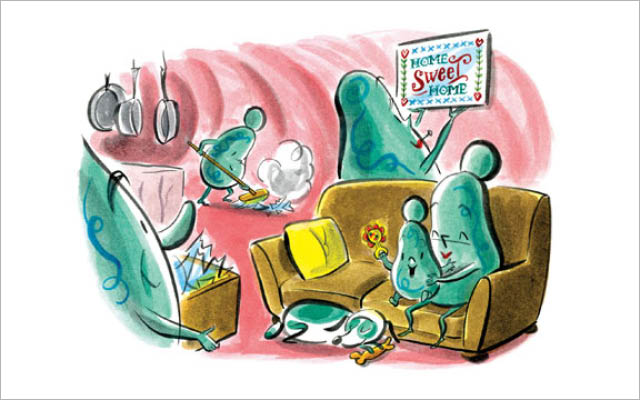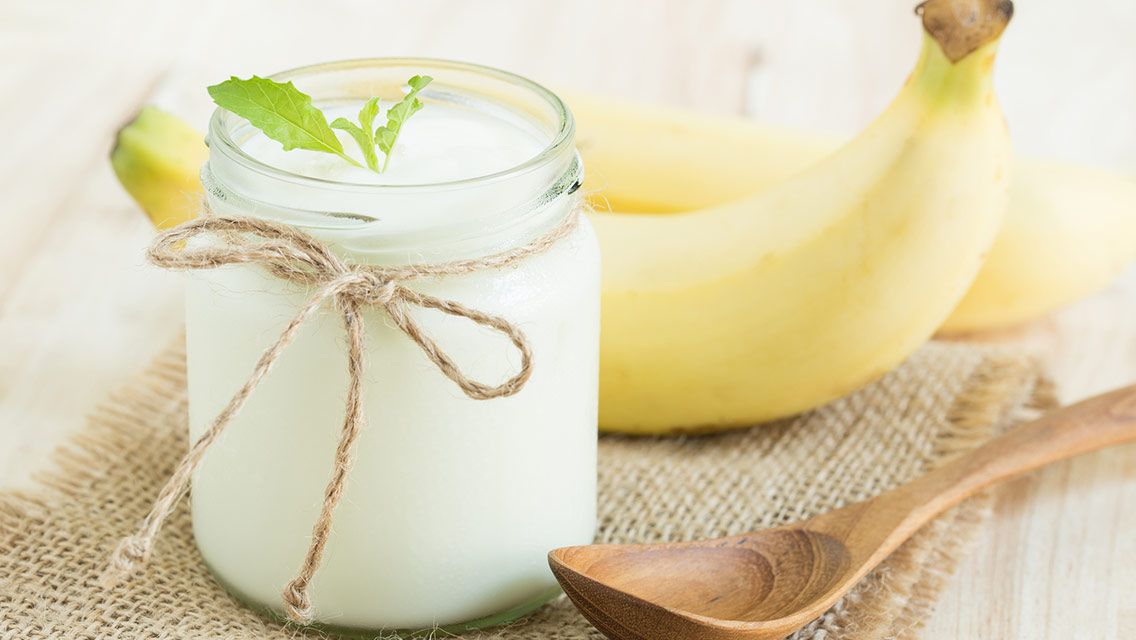Ever get the feeling you’re not alone? Maybe it’s because you’re not. Your body is a walking repository for microorganisms, and their cells outnumber yours 10 to 1. Some of us have herds of mites grazing on our eyebrows. Others have fungi meandering between our toes. No one is immune. Everyone’s skin swarms with an invisible smorgasbord of bacteria, and the mouth is a microbial wonderland. But it’s the 500 or so species of bacteria residing in our gastrointestinal (GI) tracts that really make us tick.
Yes, bacteria, such as those from the genera Bifido-bacterium and Lactobacillus, account for a large majority of the 100 trillion creepy crawlies that call your body home, and they flourish in the dark, dank folds of the GI tract. (Random parasites, yeast and fungi make up a much smaller internal population; to find out more about them, read “Little Bugs, Big Trouble”).
Good bacteria spend their days destroying their harmful cousins, picking through undigested leftovers and micromanaging calories. But when stress, medications or a poor diet (among other factors) lay waste to these friendly flora, bad bacteria rush in to fill the void. And when bad bacteria prevail, illness strikes. A short-term imbalance can lead to diarrhea, bloating and gas. Over time, the disparity can contribute to more serious problems, including inflammatory bowel disease and irritable bowel syndrome.
To balance the scales, many healthcare practitioners are turning to probiotics — infusions of good bacteria from foods like yogurt, kefir, miso, tempeh, kombucha and kimchi, as well as from supplements. (See the “Putting Probiotics on Your Side” below.) But just as planting seedlings won’t rejuvenate a deforested landscape overnight, probiotics can’t be relied on as a quick fix for a gut-destroying lifestyle.
Here’s what you need to know to keep your little buggers happy and healthy for the long haul.
The Power of the Gut’s Good Bacteria
The relationship between the gut and well-behaved bacteria is mutually beneficial. Because the gut is porous (that’s how it absorbs nutrients from food), it’s also vulnerable to invasion. Over a person’s lifetime, the GI tract handles roughly 60 tons of food. While food brings nourishment, it can also be a Trojan horse for disease. That was the case in Europe last spring, where contaminated vegetable sprouts killed 29 people and made nearly 3,000 extremely ill. And it was the case for a great many tainted hamburgers before that.
Good bacteria act as microscopic bouncers for the bowels, waving in desirable nutrients and slamming the door on dangerous viruses and killer bugs. They do this with some help from the mucosal barrier, which coats every inch of the gut’s 1,000-square-foot surface to form a slippery, protective layer. But even so, it’s a job that requires mind-boggling numbers.
One hundred trillion bacteria cram inside the average Joe. Scoop them up and they would weigh 2 to 3 pounds. Linked end-to-end, they would circle the globe two and a half times. Without them, you couldn’t digest any food. But digestion is only part of what these high achievers accomplish. Thanks to their residence in the intestines, they also help power 60 percent of the body’s immune system.
Scoop [the bacteria] up and they would weigh 2 to 3 pounds. Linked end-to-end, they would circle the globe two and a half times.
So when it comes to getting and staying healthy, balancing our intestinal microflora should be a top priority. The good news is, we’ve got a well-established and synergetic partnership going. The oldest microorganisms on Earth, bacteria have carved an elaborate evolutionary niche for themselves inside our bodies. It’s important to remember that we need them every bit as much as they need us.
“The bottom line is that we would be dead without them,” says Gregor Reid, PhD, a professor of microbiology, immunology and surgery at the University of Western Ontario in Canada and past president of the International Scientific Association for Probiotics and Prebiotics. (Prebiotics are nutrients that help probiotics and other beneficial bacteria to multiply. Learn more about the importance of prebiotics here.) “Bacteria are benefiting from the relationship, too,” he notes, “otherwise they wouldn’t have let us get this far.” He explains that several of the bacteria residing in the gut could easily kill us — but then who would feed them?
He’s got a point. Although bacteria inhabit all of the 30-odd feet of your gastrointestinal plumbing, they cluster in the dining hall that is your colon. There, they spend their days awash in waste — the bacterial equivalent of manna from heaven.
A slow-moving meal may linger in the colon for more than two days before being jettisoned. (Poop, by the way, is roughly 60 percent bacteria.) Meanwhile, like happy vultures clambering to a carcass, bacteria see what nutrient castoffs they can claim. They break down otherwise indigestible plant fibers, forage for carbohydrates and salvage calories.
“A healthy body will recycle every single molecule it can from the bowel.”
“A healthy body will recycle every single molecule it can from the bowel,” says Georgianna Donadio, PhD, nutritionist and founder of the National Institute of Whole Health, a Wellesley Hills, Mass.–based school that provides continuing education to healthcare providers. “Essentially the gut is a huge metabolic furnace.”
Of course, for that furnace to operate efficiently, all of its parts must be present and in working order. Ideally, they come custom-delivered right when we are — at birth.
Babies descend from the germ-free womb into a virtual bubble bath of bacteria. It starts with the birth canal, where mothers bequeath a starter-kit of good, colonizing bacteria to their newborns. More bacteria make their way into baby intestines via people they touch, toys they mouth and, of course, breastfeeding. (Babies born via cesarean section or fed formula imbibe a different bacterial brew, and some health experts argue that this could put them at a health disadvantage.) Regardless of where your bacterial birthday presents originate, though, the first ones to stake a claim in your gut generally reproduce steadily enough that they are yours for life.
The Impact of Antibiotics, Stress, and Diet on Good Bacteria
So, till death do you part? Well, it depends. Outside forces also hold sway over gut ecology. Antibiotics can pose a major threat to our microbial balance, because they destroy all kinds of bacteria indiscriminately. Once the good bacteria are pushed aside, there’s an opportunity for bad bacteria to move in and start colonizing.
How widespread the resulting damage might be depends on the antibiotic drug’s strength, formulation, absorbability and how long you take it. Recent studies show that just one round of antibiotics can suppress beneficial bacteria for up to 16 months.
“Antibiotics can decimate life as we know it in the gut,” says Patricia Raymond, MD, a gastroenterologist in Norfolk, Va., and founder of YourHealthChoice.net. “It’s like setting off an atomic bomb in the intestines.”
Still, under some circumstances, antibiotics are essential to fending off a dangerous or even life-threatening infection. If you do need to take antibiotics, the key is to use them wisely, carefully following your doctor’s dosing instructions, and then following up with good-bacteria-rebuilding strategies that help keep opportunistic bad bacteria from taking over. (See “7 Steps to Helping Good Bacteria Feel at Home” below.)
Keep in mind, too, that antibiotics aren’t the only threat to your good bacteria’s quality of life. Take your stress level, for example. Stress can damage the gut’s flora in a couple of ways. For starters, stress slows the body’s ability to heal tiny fissures in the intestinal lining. Bacteria sneak through the openings and settle inside the gut’s walls where they cause inflammation (see “How to Heal a Leaky Gut” to learn more). Second, stress can speed up or slow down the contractions in the small intestine, affecting the rate food moves through your system.
“The more stressed you are, the more suppressed your immune system gets, which gives bad bacteria an opportunity to proliferate.”
To study the effect of stress on beneficial bacteria, scientists looked at the GI tracts of stressed-out college students, as well as angry and fearful people. Across the board, stress threw open the door to disease-causing thugs. “The more stressed you are, the more suppressed your immune system gets, which gives bad bacteria an opportunity to proliferate,” says Donadio. “It’s a vicious cycle.”
OK, so you shun antibiotics, chill out regularly, but still feel bloated, constipated and gassy? Take a good, hard look inside your refrigerator. Everything you eat either feeds the good guys or nourishes the bad. For gut health, experts preach the importance of whole foods and a mostly plant-based diet.
“A healthy bowel is designed for the high-water, high-fiber and high-nutrient-content foods found in the plant world,” says Donadio.
Meanwhile, diets high in animal protein, processed foods, and especially flours and simple sugars tend to raise the numbers of potentially harmful bacteria — perhaps, in part, because such excesses tend to upset the natural acid-alkaline balance of our bodies. “The problem is that the human digestive system hasn’t changed in thousands of years, but our diet has shifted dramatically,” says Reid.
Our ancestors filled up on plants and roots, all alkaline and brimming with good bacteria. But the modern American’s diet overflows with acidifying sugars, meats and dairy, plus salt and poor-quality fats. In the struggle to break down these substances, the gut produces toxic byproducts that can make us sick.
What Happens When Gut Bacteria Goes Awry
Regardless of where the imbalance originates — a pill bottle, the office or the kitchen — one thing is undisputed: An unhealthy gut spells trouble for the whole body. In particular, the more researchers delve into the inner workings of the gut’s ecology, the greater number of parallels they find between bacterial imbalance and gastrointestinal disease.
Some of the best proof tying bacterial malfunction to GI distress focuses on inflammatory bowel disease (IBD). An umbrella term covering both Crohn’s disease and ulcerative colitis, IBD is an autoimmune disease that triggers inflammation in the gut’s lining; it afflicts more than a million Americans.
Symptoms of IBD include abdominal pain and cramping, diarrhea, bleeding, weight loss, and anemia. With much of IBD a mystery, treatments have focused mostly on managing symptoms. But recent studies point to a disruption in the gut’s flora as a possible root cause. The news has more doctors reaching for probiotics. “For IBD, the drugs are good, but the drugs plus probiotics are much better,” says Raymond. “The results are startling.”
Solid science also backs probiotics in the treatment of diarrhea and irritable bowel syndrome, and probiotics’ benefits may ripple well beyond the bowel. Researchers are trying probiotics to treat eczema and rheumatoid arthritis, and to prevent vaginal and urinary tract infections.
“There isn’t a drug on the market that can match bacteria for its far-reaching implications on health [that probiotics can offer].”
“There isn’t a drug on the market that can match bacteria for its far-reaching implications on health,” says Reid, who predicts people will eventually swallow probiotics custom-made to meet their body’s needs.
Indeed, bacteria may be recruited to help solve one of America’s most serious epidemics — obesity.
A 2006 study at Washington University in St. Louis’s School of Medicine found big differences between the collections of gut bacteria in heavy people and their slender peers. The roles of heredity, diet and exercise notwithstanding, researchers suspect some people’s bacteria are simply better at helping them stash away calories.
“Differences in our gut microbial ecology may determine how many calories we are able to extract and absorb from our diet and deposit in our fat cells,” says Jeffrey Gordon, MD, the study’s lead author and the director of the university’s Center for Genome Sciences. “Even if the differences aren’t great, over the course of a year or more, the effects could add up.”
Putting Probiotics On Your Side
Probiotics aren’t a surefire cure-all for a troubled gut, but they do deliver a whole lot of helpful bacterial right where you need them.
If you’re otherwise healthy, you can focus on just eating more probiotic-laden foods, like a yogurt with live cultures, says Patricia Raymond, MD, a gastroenterologist in Norfolk, Va., and founder of YourHealthChoice.net.
For many, though, a daily, quality probiotic supplement is a good idea — especially to battle chronic gastric complaints, such as diarrhea, inflammatory bowel disease and irritable bowel syndrome. It’s also a worthy addition if you’re on an antibiotic or have taken antibiotics in the past. (If you’re still on the drug, consider a yeast-based probiotic, since the antibiotic won’t affect it.)
“Health is a continuum, so you have to take probiotics on a regular basis to retain their benefits.”
If you need a probiotic pick-me-up, prepare to stock up. A week or two of probiotics can be a quick fix for an acute problem, like traveler’s diarrhea, but those with a chronic illness may need probiotics for an extended duration. That’s because these bacteria don’t stay inside us for long. “You can’t just take one dose, sit back and say ‘that’s great,’” says Gregor Reid, PhD, a professor of microbiology and immunology at the University of Western Ontario and past president of the International Scientific Association for Probiotics and Prebiotics. “Health is a continuum, so you have to take probiotics on a regular basis to retain their benefits.”
To boost your flora, take one or two probiotic capsules daily, which amounts to 3 to 5 billion live organisms. Probiotics are living, so they are vulnerable to heat, cold and moisture. Store them in a cool, dry place. (Also take care with probiotics in food. Freezing live-cultured yogurt or boiling miso soup nukes the bugs.) Lastly, Reid recommends buying only products that have been clinically tested. “Too many haven’t,” he says, “and just because the contents of one product sound like those of another doesn’t mean it will work.” ConsumerLab.com, an independent watchdog group, vetted 22 probiotic products and found several that didn’t deliver.
7 Steps to Helping Good Bacteria Thrive
Maintaining a healthy gut isn’t as easy as popping a magic pill. “If you’re going to use probiotics, then drink, smoke and eat badly, that’s not going to cut it,” says Georgianna Donadio, PhD. “The entire system must be in sync; the flora is just the tip of the iceberg.” To take a big-picture approach to your gut, consider these steps:
- Eat several small meals during the day instead of pigging out at dinner. “Cramming in all your food at the end of the day stresses the gut by giving it too much food at once,” says Leslie Bonci, a registered dietitian and director of the Sports Nutrition Center at the University of Pittsburgh. And don’t forget to drink plenty of water to keep the food moving.
- Prioritize whole foods. That means stocking up on vegetables, fruits, nuts and legumes. If the food on your plate looks like food in the wild (e.g., grapes, not grape roll-ups), you’re off to a good start. “The best way to restore your gut is to stop assaulting it [with processed food] all the time,” says Patricia Raymond, MD.
- Eat probiotic foods. Shoot for at least one daily serving of a food with probiotic or “live” cultures. Try yogurt, kefir (a fermented dairy drink), miso or tempeh. Look for the phrase “contains live cultures” or “active cultures” on the label.
- Bulk up on fiber. The more fiber you have in your diet, the more diversity you’ll have in your ecosystem. Aim for 25 to 38 grams of fiber a day, says Bonci. “Most people are still shy of their fiber intake.” (See “Fiber: Why It Matters More Than You Think” for more.)
- Cut back on sugar. Refined sugars acidify the system and prompt the body to make more bile — and some types of bad bacteria feast on sugar and bile acids. Therefore, too much sugar may tip the bacterial balance toward the dark side. “With all the sugar we throw down these days, it’s no wonder our bacteria colonies are out of whack,” says Bonci.
- Relax. In a 1999 study published in the international journal Gut, people in gastrointestinal clinics cited severe life stress as a precursor to their gastrointestinal problems. Although the connection isn’t clear, scientists do know that stress breeds inflammation and also upsets the parasympathetic nervous system, which controls the contractions of the intestine, thereby changing the speed at which food moves through you. Stress affects our biochemistry at many levels.
- Get seven to eight hours of sleep every night. Sleep not only regulates hormones in the gut that contribute to feelings of hunger and satiety, it also shores up the immune system. When the body is deprived of sleep, even for one night, the immune system suffers, says Bonci.
Like tending a vegetable patch, maintaining a balanced microflora environment requires daily attention. Need more good reasons to give your bacteria the respect they deserve? Consider this: “If a freeze, flood or nuclear explosion destroyed all the humans on Earth, bacteria would survive,” says Gregor Reid, PhD. “They are definitely going to have the last laugh.”
This article originally appeared as “Good Bacteria Welcome.”



This Post Has 0 Comments